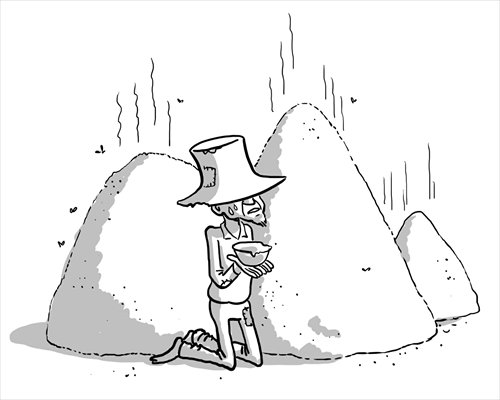Thai rice farmers pay heavy price for politics

Illustration: Liu Rui/GT
The election for the House of Representatives of Thailand ended in protests and obstructions of the oppositions earlier this month. It is no surprise that following a public boycott by the Democrat Party, the election was stranded, sending Thailand's political situation one move closer to a complete stalemate.
The election committee has decided to set makeup voting to be held in April, which means there will still be unrest before the next Thai leadership steps into office. This will bring many aspects of Thai business life to a complete standstill for a few months.
Since November, the growing tensions in Thailand have severely corroded the social and economic development of the country. Tourism, the pillar industry of the Thai economy, has incurred great losses, and consumer confidence and private investments have also been struck.
More devastatingly, the political turbulence has inflicted a heavy blow on Thai rice farmers. Unable to continue to assume its responsibility for the rice subsidy scheme, the government of Yingluck Shinawatra, sister of exiled former prime minister Thaksin Shinawatra, has pushed many rice farmers to bankruptcy.
Now those farmers, already barely able to make ends meet, are swarming into streets to protest, pushing the Yingluck government into an even worse crisis.
Since 2011, controversies in Thailand about the rice subsidy scheme have become ever tenser, especially when the international grain prices are declining. Financial losses are expanding because of the scheme, and the middle-class is highly opposed to it.
Opposition from the middle class is a powerful driver of the ongoing political crisis. The opposition in Thailand attributes the current hardship that Thai rice farms are enduring to the failure of the rice subsidy scheme, demanding Yingluck resign.
Although the subsidy scheme has shortcomings, it is a reasonable pick, in the short term, out of several bad options.
As a middle-income country, Thailand is trapped by the enlarging gap between its urban and rural development, between the rich and the poor, and among different places.
Rural development should be the top priority on the government's agenda, in order to avoid the country getting old before it gets rich and to escape of the daunting middle-income trap.
But the, rice subsidy scheme does not deserve to be a long-term plan, and is certainly not the optimal option. After the long-standing political crisis, the strength of the Thai government has become much weaker, which means it is becoming less able to carry out the policies which require long-term and strong execution.
In the short term, the rice subsidy scheme is conducive to relieving the shortage of financial support in rural areas, and can provide a necessary shield to rice farmers when international grain prices fluctuate. Generally speaking, the benefits it can produce outweigh the trouble it makes.
However, keeping the scheme will be costly. Since the plan is operated by pro-Thaksin forces, the cost will unfortunately be transferred to the middle-income groups with vested interests, which will trigger bigger resistance from the opposition.
The ineffectiveness of the rice subsidy scheme, which has ultimately harmed the interests of rice farmers, should be pinned on the much weakened power of the Thai government due to deteriorating political impasse.
The never-receding clashes between anti-Thaksin and pro-Thaksin forces have cost the country any sense of unity and order. There are tug of wars in almost every phase of policy execution, and even the reciprocal "rice for high-speed rail" project between China and Thailand has fallen victim to these battles.
Unless all parties could reach a compromise to rebuild the authority of the Thai government on the basis of a new political consensus, Thailand will pay a heavy price for its domestic political chaos.
And Thai farmers, who are less capable of fending off risks, will foot the entire bill of the political crisis and become the most miserable victims of this clash.
The author is an associate research fellow at the National Institute of International Strategy, Chinese Academy of Social Sciences. opinion@globaltimes.com.cn